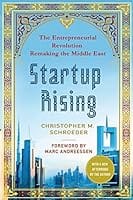Startup Rising
Published:
Startup Rising

Metadata
- Author: Christopher M. Schroeder and Marc Andreessen
- Full Title: Startup Rising
- Category: #books
Highlights
- The West tends to look at the world through the prism of its own successes, and believes that it has a monopoly on innovative ideas and entrepreneurship. Nothing amuses the entrepreneurs I meet around the world more than when some U.S. politician refers to entrepreneurship as a “leading American export,” as if other, thousands-of-years-old entrepreneurial cultures have only recently discovered it. (Location 231)
- Basic cell-phone penetration in Egypt, a land of 80 million people with annual per capita GDP under $6,500, is over 115 percent. The penetration numbers hold true throughout the Middle East. Yet currently only 8 to 12 percent of these users have access to smartphones. (Location 274)
- Should we be surprised that Kenya, with no legacy of wired telephone service and limited banking services, would be the birthplace of the mobile payments company M-Pesa—representing today nearly half of all mobile payments in the world, and processing 20 percent of the country’s GDP? (Location 277)
- First, technology offers an irreversible level of transparency, connectivity, and inexpensive access to capital and markets unprecedented only five years ago. (Location 300)
- Second, this generation benefits from regional and global capital now more comfortable with political risk. (Location 304)
- Third, changing market dynamics, growth, and opportunity in the Middle East were in motion well before the uprisings. (Location 309)
- “In 2008 the GDP of the economies of five of the largest countries in and around the Middle East—Egypt, Iran, Pakistan, Saudi Arabia, and Turkey, with a combined population of 420 million—was $3.3 trillion, the same size as that of India, which has three times the population.” (Location 311)
- As one Egyptian executive wrote me, “It’s not that we don’t appreciate stableness—that the most successful ecosystem for entrepreneurs has this at their foundations. It’s that the word ‘stability’ was used by the regimes and our parents as an excuse for accepting an unacceptable status quo. We can be better.” (Location 324)
public: true
title: Startup Rising longtitle: Startup Rising author: Christopher M. Schroeder and Marc Andreessen url: , source: kindle last_highlight: 2019-07-02 type: books tags:
Startup Rising

Metadata
- Author: Christopher M. Schroeder and Marc Andreessen
- Full Title: Startup Rising
- Category: #books
Highlights
- The West tends to look at the world through the prism of its own successes, and believes that it has a monopoly on innovative ideas and entrepreneurship. Nothing amuses the entrepreneurs I meet around the world more than when some U.S. politician refers to entrepreneurship as a “leading American export,” as if other, thousands-of-years-old entrepreneurial cultures have only recently discovered it. (Location 231)
- Basic cell-phone penetration in Egypt, a land of 80 million people with annual per capita GDP under $6,500, is over 115 percent. The penetration numbers hold true throughout the Middle East. Yet currently only 8 to 12 percent of these users have access to smartphones. (Location 274)
- Should we be surprised that Kenya, with no legacy of wired telephone service and limited banking services, would be the birthplace of the mobile payments company M-Pesa—representing today nearly half of all mobile payments in the world, and processing 20 percent of the country’s GDP? (Location 277)
- First, technology offers an irreversible level of transparency, connectivity, and inexpensive access to capital and markets unprecedented only five years ago. (Location 300)
- Second, this generation benefits from regional and global capital now more comfortable with political risk. (Location 304)
- Third, changing market dynamics, growth, and opportunity in the Middle East were in motion well before the uprisings. (Location 309)
- “In 2008 the GDP of the economies of five of the largest countries in and around the Middle East—Egypt, Iran, Pakistan, Saudi Arabia, and Turkey, with a combined population of 420 million—was $3.3 trillion, the same size as that of India, which has three times the population.” (Location 311)
- As one Egyptian executive wrote me, “It’s not that we don’t appreciate stableness—that the most successful ecosystem for entrepreneurs has this at their foundations. It’s that the word ‘stability’ was used by the regimes and our parents as an excuse for accepting an unacceptable status quo. We can be better.” (Location 324)